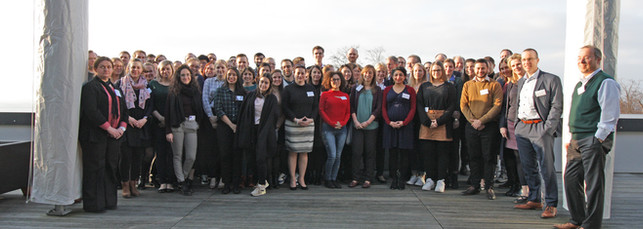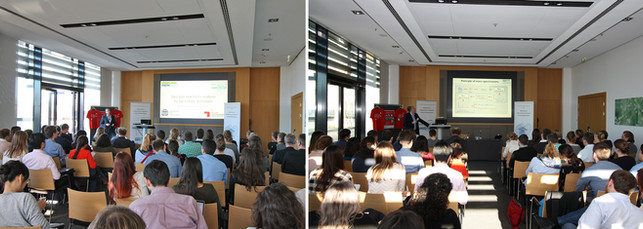
Dr. Heidi Noels and Dr. Yvonne Döring receive the W.H. Hauss Award from the DGAF
19-21 April 2018
Dr. Heidi Noels from the Institute for Molecular Cardiovascular Research at RWTH Aachen University together with Dr. Yvonne Döring from the Institute for Prophylaxis and Epidemiology of Circulatory Diseases at LMU Munich together received the DGAF W.H. Hauss Award 2018 from the German Society for Atherosclerosis Research (DGAF) during the 32nd Annual Meeting of the DGAF in Rauischholzhausen, Germany. They were awarded for their publication "Vascular CXCR4 Limits Atherosclerosis by Maintaining Arterial Integrity: Evidence From Mouse and Human Studies." (Circulation. 2017; 136: 388-403). In this work it could be shown that vascular CXCR4 has an atheroprotective function by maintaining the arterial integrity and preserving the endothelial barrier function. In addition, CXCR4 stabilizes a contractile smooth muscle cell phenotype. Targeted enhancement of these CXCR4-mediated protective functions could open up novel therapeutic options in the treatment of atherosclerosis.
The award was sponsored by a long-standing active member of the DGAF, Prof. Dr. Winfried März.
Project area Z
Administrative project
Robert Werner Mertens
MD student
University Hospital RWTH Aachen
Department of Internal Medicine
Project: The role of incretin hormone GLP-2 in septic cardiomyopathy
PI: Michael Lehrke
Robert Werner Mertens
MD student
University Hospital RWTH Aachen
Department of Internal Medicine
Project: The role of incretin hormone GLP-2 in septic cardiomyopathy
PI: Michael Lehrke
Consortium


Mechanisms of Cardiovascular Complications
in Chronic Kidney Disease
The SFB/TRR219 is supported by the German Research Foundation (DFG)
Project-ID 322900939
PhD MD TRR219-associated students

Robert Dzhanaev
PhD student- Marie Curie ITN INTRICARE
University Hospital RWTH Aachen
Institute for Biomedical Engineering - Biointerface Laboratory
Project: Innovative platforms to generate fetuin-A based imaging agents for diagnosis and treatment of microcalcification
PI: Wilhelm Jahnen-Dechent
Vulnerable plaques are prone to cause acute vascular events such as AMI and stroke, thus presenting an important mortality risk factor. Microcalcification is recognized as a cause of vulnerable plaque formation. Fetuin-A has been identified as a powerful liver-derived circulating inhibitor of vascular and soft-tissue calcification.
Fetuin-A-containing calciprotein particles (CPPs) facilitate the clearance of calcium phosphate nanocrystals from the extracellular fluid, thus being involved in mineral metabolism and related pathological conditions. Lack of fetuin-A causes critical dysregulation of extra-osseous mineralization inhibitors system.
I aim to develop methods of fetuin-A-based theranostics of soft tissue microcalcification using in-house preclinical models. For these purposes, fetuin-A-RANKL fusion protein will be generated in order to cause local osteoclast activation followed by calcium release at ectopic mineralization sites.
Additionally, RFP-labeled fetuin-A will be synthesized and tested on calcification-prone mice. The novel fetuin-A-based theranostics is foreseen to be implemented into clinical practice for microcalcification imaging and non-invasive treatment, especially in CVD/CKD patients.











